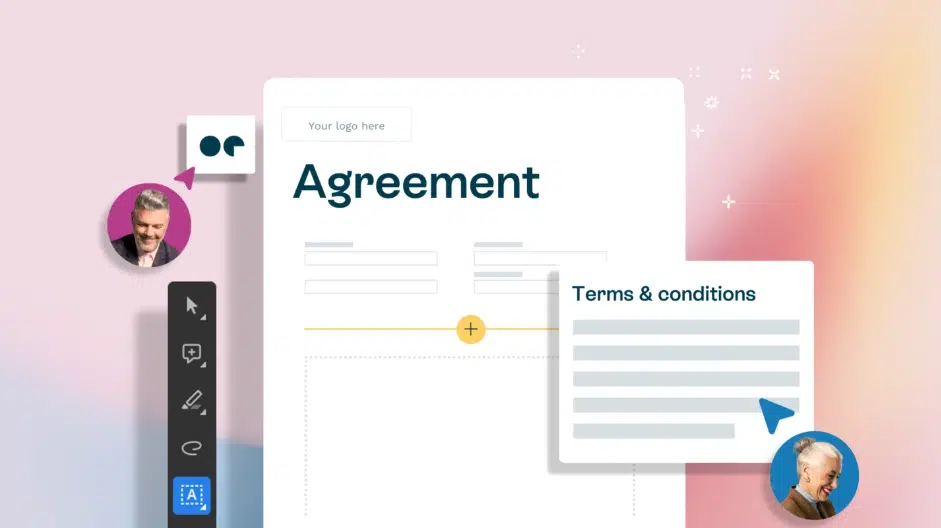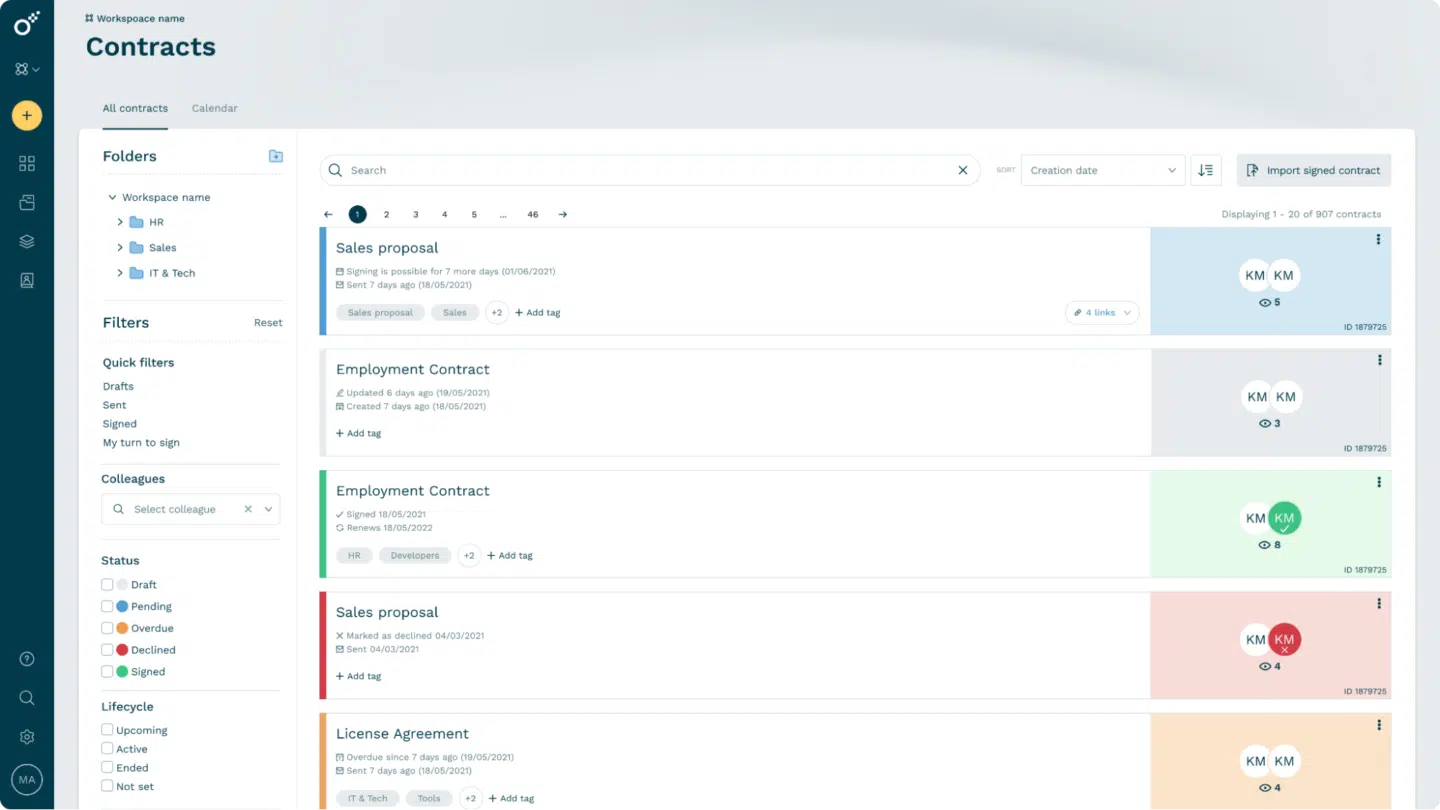Research shows that it takes lawyers about 50 minutes to review a single contract. And these are professionals who do this daily. Imagine how much longer it might take for someone without their expertise.
The reason it takes time is simple: a proper contract review requires attention to detail. Missing vague clauses or unfair terms can lead to expensive disputes and missed opportunities. Every word matters when you’re checking the agreement is fair, compliant and truly works for you.
So, how do you ensure your contract review is accurate?
That’s what this guide is all about.
I’ll break down the key elements of a contract, walk you through a step-by-step process with contract review tips and explain the role of legal counsel. I’ll also introduce you to Oneflow—a smart tool that makes your contract review easier, reduces mistakes and saves time so you can confidently send and sign contracts.
Understanding the importance of contract review
Contract review is critical in business operations. It involves thoroughly analyzing and understanding the terms, conditions and clauses outlined within a contract. By carefully reviewing contracts, businesses can identify potential risks, obligations and opportunities for negotiation.
One key aspect of contract review is ensuring that all parties involved in the contracting process clearly understand their rights and responsibilities. This prevents misunderstandings and disputes, ultimately fostering stronger business relationships.
See also: What is contract management? Your ultimate guide

The role of contract review in business
A contract review safeguards businesses by ensuring that contractual agreements align with their strategic objectives, comply with legal regulations and protect their interests. It allows parties to assess the feasibility and potential risks of entering a contract before committing to it.
This process also allows businesses to evaluate the financial implications of the agreement. By carefully examining the payment terms, penalties for breach and other financial aspects, companies can better manage their cash flow and budget.
See also: Why contract reviews are essential for your business?
Legal implications of contract review
Contractual obligations can profoundly impact businesses. A thorough contract review identifies ambiguous or unfair terms that may lead to legal disputes. By understanding contract law and its legal implications, companies can make informed decisions and protect their rights.
Reviews can also shed light on any potential regulatory compliance issues. Ensuring that contracts adhere to industry-specific regulations and standards is crucial for avoiding costly fines and penalties in the future.
See also: What are legal contracts?

Key elements of a contract
Contracts contain elements that define the parties involved and their responsibilities. Familiarizing oneself with them is crucial for a comprehensive review.
However, understanding the nuances of a contract goes beyond just knowing the basics.
You need to review the details of the legal language carefully, look for any potential loopholes and understand the implications of each clause.
Below are the key elements of a contract to pay attention to during a contract review.
Parties involved in a contract
A contract typically involves two or more parties, called “contracting parties”. Identify each party involved, their roles and obligations upon signing the contract.
You should also determine each party’s legal capacity. Ensuring all parties entering the contract are of sound mind, legal age and have the authority to do so can prevent future disputes and challenges to the contract’s validity.
Terms and conditions to look out for
Contracts contain terms and conditions that outline the scope of the agreement, payment terms, delivery timelines, warranties and dispute resolution mechanisms. Paying close attention to these provisions helps ensure they align with the business’s aspirations and expectations.
Understanding the implications of each term is also important. For example, scrutinizing the payment terms can reveal details about installment schedules, late payment penalties and any conditions precedent to payment. This level of detail can prevent misunderstandings and financial losses later.
The role of a legal team in contract review
A legal review is essential, as it provides valuable expertise and guidance.
When to seek legal advice
Engaging legal counsel is essential when dealing with complex contracts, unfamiliar legal affairs or high-stakes transactions. Legal professionals can provide insights and ensure compliance with relevant laws and regulations.
How legal counsel facilitates contract review
Legal counsel assists in contract review by identifying legal risks, negotiating terms on behalf of their clients and ensuring that the final contract aligns with their best interests. Their expertise helps safeguard businesses from potential pitfalls and ensures a smoother contract review process.

Step-by-step process of contract review
Now that we’ve covered the importance of contract review, the key contract elements and how you can benefit from legal counsel, it’s time to move on to the actual process of reviewing contracts.
Here are steps to use as your contract review checklist.
1. Examine the purpose and context of the contract
The first step in contract review is conducting an initial assessment. This involves understanding the contract-related facts like its purpose and context. Start by clarifying why the agreement is being made and the responsibilities of each party. Then, verify that all parties are identified and ensure their names and roles are correctly listed.
Bonus tip: Ensure that all pages of the contract are present and properly numbered (e.g., “Page 1 of 10”). This way you can be sure that all content is included.
2. Read the entire contract
Now, it’s time to read the entire contract thoroughly. Don’t skim—take your time to fully understand its structure, key clauses and terms. Verify essential details, such as names, dates and values. Make sure that dates, prices and other key components match your understanding of the agreement.
Familiarize yourself with the contract’s timeline, including the effective and expiration dates, renewal terms and provisions for automatic renewal.
Go through all parts of the contract—attachments, footnotes and any fine print. Take notes and highlight sections that need further attention, especially if they’re unclear or potentially problematic.
3. Review the contract clause-by-clause
Once you complete the initial assessment and the first reading of the business contract, go on to a detailed examination of the contract provisions. This includes scrutinizing terms, conditions, clauses and obligations to identify potential risks, inconsistencies or ambiguities.
Carefully analyze each provision in the contract to ensure it’s clear, unambiguous and legally enforceable. Once again, don’t hesitate to highlight and take notes of any vague language or loopholes that could lead to misinterpretation or disputes.
Bonus tip: Review key clauses first, like confidentiality, indemnification and termination. Ensure they protect your interests and identify any provisions that don’t align with your company’s standard terms or legal guidelines.
See also: How AI streamlines the contract review process

4. Check clarity and legal compliance
Review the language used, eliminate redundant or ambiguous terms and ensure consistency throughout the document.
In this step, confirm that the contract aligns with applicable laws, regulations and internal policies. Ensure all obligations are defined correctly and that termination terms are clearly stated. Pay close attention to default clauses that outline what happens if one party fails to fulfill their commitments.
You should also check for automatic renewal language that explains how the contract will automatically renew. This clause ensures the agreement continues without renegotiating terms or signing a new contract each time the term ends. If it exists, make sure you’re comfortable with the terms, which usually include renewal after a certain period unless one party chooses to cancel.
Bonus tip: Ensure all factual details, such as names, dates and amounts, are accurate and consistent throughout the document.
5. Assess the risks
Check for areas where the responsibilities are unclear or one party might be unfairly held responsible for too much. Verify who is responsible for covering potential damages, any promises about the subject’s quality or condition, and protections against unexpected events. Pay attention to any missing safeguards or clauses that could lead to misunderstandings or disputes later.
Check for confidentiality agreements if the contract involves sensitive information, intellectual property or trade secrets.
You should also ensure that the dispute resolution method aligns with your business’s approach and preferences. For example, if you’re reviewing a contract your business is signing with another company, check if it suggests mediation or negotiation before going to court.
See also: Contract risk management: The benefits and how it works
6. Prepare for negotiation
Revisit the sections you marked earlier for potential risks and concerns to discuss with the other party(ies). Prioritize the issues so you focus on key changes and ensure the negotiation stays on track and aligns with your objectives.
Consider your advantages and try to predict the other party’s perspective. Aim to suggest fair and reasonable changes that meet everyone’s goals.
7. Perform final checks
Look over the document for any blank spaces and ensure all fields are filled out correctly or removed if unnecessary. Go through the entire document again and repeat any earlier steps if needed.
When you’re done, share the updated contract with the legal team and all relevant stakeholders for final approval. Make sure everyone has a chance to share their input and agree on the final version. After incorporating all internal feedback, the contract is ready to be signed.
Make your contract review easier with AI
The same research we mentioned in the introduction also found that AI can perform the same process much faster. In fact, it took advanced AI models an average of 131 seconds to review a contract! That’s right—AI can handle all the steps outlined above in little more than two minutes.
Have you tried Oneflow AI in your contract review processes?

Oneflow is contract management software that simplifies contract review. Its AI tools can analyze agreements to identify potential risks, highlight unclear terms, and ensure compliance. All you have to do is make a couple of clicks.
Here are the Oneflow AI tools that help you speed up and improve the accuracy of your contract reviews:
- AI Review: Oneflow’s AI Review spots risks, missing clauses and compliance issues instantly. It checks your contracts against legal guidelines and ensures they meet the standards. Use it while reviewing contracts to add more accuracy and catch potential errors.
- AI Insights: This tool provides reports for all your contracts in your portfolio, showing whether they meet legal and business requirements. You get access to a dashboard that summarizes all your contract reviews, helping you spot any issues or risks, such as compliance problems or missing clauses.
- Write with AI: Quickly rewrite unclear sections, ensure compliance and improve your language with Write with AI. Simply highlight the text, click the Write with AI button, and choose from pre-made recommendations to rewrite unclear sections, fix errors or ensure compliance. You can also create your own suggestions to match your needs. This helps you make clearer, more accurate contracts while saving time and effort.
What else can Oneflow do for you?

Oneflow is a complete contract automation tool. It assists you in the review process and all other aspects of managing contracts, such as:
- Contract creation: Create contracts in just a few clicks with Oneflow’s visual builder. Customize templates from the contract library or create new ones to save time in the future.
- Team collaboration: Edit, comment and track updates together as a team. Oneflow lets you view and provide feedback in real time. You can control who can make changes, add comments with permissions and track version control.
- Secure signing: Sign your contracts remotely and securely with any electronic signature options you prefer—standard, handwritten signatures, SMS verification or electronic IDs.
- Contract tracking: Access Oneflow’s analytics dashboard to see when contracts are opened or reviewed. Use those insights to adjust and improve your contract workflows.
- Document storing: Have all your contracts in one secure place—your account’s archive. Oneflow securely stores all your documents and automates workflows to delete outdated or rejected contracts.
Oneflow offers a free plan forever. It also gives you full access to all premium features for the first 14 days. This means you get to experience the complete potential of how the platform makes your contract management easier.
Start your free plan to automate and improve your contract workflows.
The key takeaways
Contract review helps businesses understand their contractual obligations, assess potential risks and protect their interests. By following the steps and using the tips outlined in this guide, your contract review process will be effective, efficient and yield favorable outcomes.
For extra confidence, try Oneflow software.
Its AI Review analyzes your contracts in seconds, identifying risks and compliance issues. You can also count on AI Insights for due diligence, get clear reports on all your contract analyses and ask Write with AI to suggest improvements for clarity.
But that’s not all—contract review is just one area where Oneflow supports your business. It also offers tools for fast contract creation, digital signatures, smooth collaboration with your team and centralized contract storage—all in one easy-to-use platform.
Ready to try it yourself?
Disclaimer:
All information on this page is derived from publicly available sources such as G2, Capterra, and other software listing sites. Oneflow does not verify the accuracy, completeness, or currentness of this information. Accordingly, Oneflow assumes no responsibility or liability for any inaccuracies, errors, or omissions in the content, nor for any actions taken in reliance on such information. Users are advised to independently verify any information before making decisions based on it.
FAQs
What is the contract review process procedure?
The generally accepted contract review process ensures the clauses are legally compliant, transparent and risk-free. It also includes making necessary changes and confirming that the contract aligns with the business’s goals.
What are the techniques of contract review?
Techniques of contract review can be manual, where you perform the review on your own, or automated, where you use a contract review tool like Oneflow to analyze contracts quickly and accurately.
What is AI contract review?
AI contract review uses artificial intelligence to identify potential risks in contracts. Oneflow includes AI tools like AI Review, AI Insights and Write with AI to scan your contracts in seconds, flag areas for improvement, and offer insights and ensure compliance.
How long should a contract review take?
The time needed to review a contract depends on its complexity. Simple agreements may take a few hours, while more complex ones can take days or weeks. Using tools like Oneflow can help speed up the contract review process.









